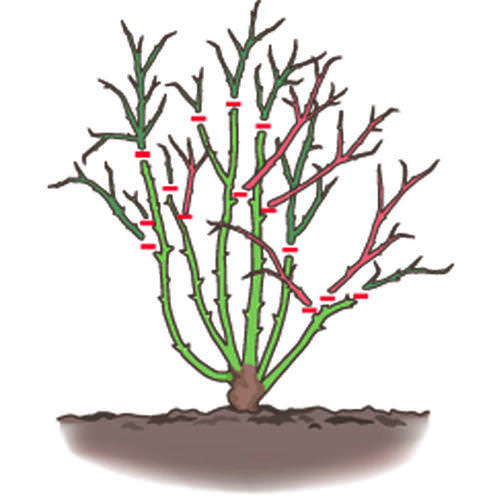






If you have roses in your garden, chances are, you need to learn how to prune them. Why prune? Here’s the thing… most roses are a lot tougher than we give them credit for… In fact, it can be pretty hard to kill a rose! But just because they can survive through a lot of neglect, doesn’t mean they will be healthy, or beautiful. Pruning helps the rose plant in three ways…
All in all, if you have roses, prune them. And it’s pretty easy! Here is a quick how-to on pruning roses.

When?
Prune roses about a month before your last frost, before many new leaves emerge. In mild climates this is likely January, the colder your climate the later you prune, all the way up to March. If your rose is breaking dormancy and starting to put out lots of new leaves, you’ve waited too long, but it’s not too late to do a light pruning of dead canes, and to lightly shape the plant. (It’s always ok to prune out dead, dying or diseased wood, no matter where you are in the season.)
Tools?
Use a sharp pair of pruning shears, and make sure they are clean so they don’t pass on disease from other plants. You can always wipe your tools with a bleach solution after pruning to keep them disease free. Allow to dry thoroughly before using. Ratchet pruners are great for those who find it tough to get through those thicker canes.
What?
So the big question is, what to prune? First, where do you make the cuts?
Always cut on a 45 degree angle about 1/4 inch above a swollen leaf node. This diagram shows us how its done…

So now you know where to cut, now what do you cut?
The best choice for most gardeners is to do a moderate pruning. This helps keep the bush healthy, and produces armloads of pretty blooms for you. A light pruning might be done if you were interested in a larger bush, with more, but smaller flowers. A hard pruning, meaning pruning more than half the plant back, is often done for roses meant for show. It puts more energy into the blooms, producing larger, and more spectacular flowers.
How to do a moderate rose pruning.

Some people use a sealant on the cuts after pruning, though I have never found that necessary. Remember to always dispose of diseased canes properly and not add them to a compost pile or community yard waste container to prevent spreading the disease.
Throughout the season, lightly prune back dead and dying flowers to promote further blooming, and always cut back and dispose of dead canes or canes that prevent good shape or air circulation of the plant.
One more tip? Gloves. Leather gloves. And when you are done, you will be rewarded with healthy, beautiful roses!

Copyright © www.100flowers.win Botanic Garden All Rights Reserved